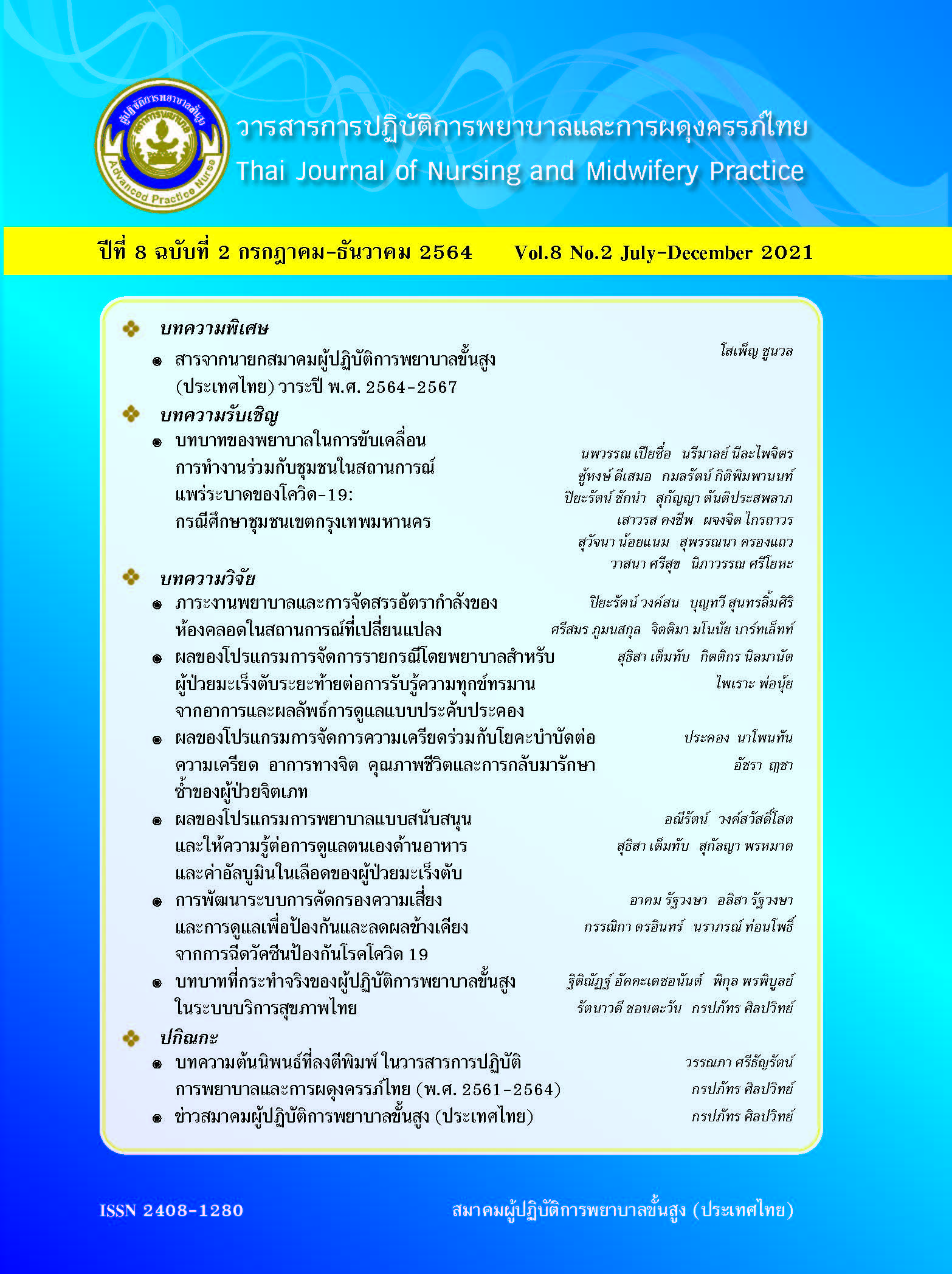Development of Risk Screening and Care Taking Systems to Prevent and Reduce Adverse Events after COVID-19 Vaccination
Main Article Content
Abstract
Screening for risk and caring at pre - post vaccination, are important steps for clients’ safety. This action research aimed to develop system for risk screening and care-taking to prevent and reduce adverse events after COVID-19 vaccination. Research was conducted during January to November 2021. It was devided into 3 phases: situational analysis phase, implementation phase, and evaluation phase. Participants were: seventy nine multidisciplinary care personel and clients who came for services during study process. Data were collected by focus group, questionnaires, and records. Research tools were: data recording form, risk assessment for adverse events following immunization (AEFI) and clients’ satisfaction forms. Quantitative data were analyzed by descriptive statistics and qualitative data were analyzed using content analysis. Results: (1) Situational analysis phase, problems of inconsistent screening guidelines, inadequate service location, and insufficient workers were reported; (2) System development phase, 6 components based on WHO’s health systems framework were developed, comprising of national vaccination policy, sufficient and competent workforce, screening service delivery and practice guidelines, appropiate and ready to use of tools, equipments and places, getting access to essential drugs, and availability of knowledge packages and routes of communications; and (3) Evaluation phase, valid risk screening and care-taking systems were developed. The AEFI before and afer the system development was decreased from 15.57 percent (from 1,143 doses) to 3.69 percent (from 46,536 doses). The mean score of clients’ satisfaction improved from 76.61 to 92.11 percents. The system developed with clear guidelines helped the care teams worked appropriately. The clients were satisfied with the services and got access to vaccination safely.
Downloads
Article Details

This work is licensed under a Creative Commons Attribution-NonCommercial-NoDerivatives 4.0 International License.
References
World Health Organization. Coronavirus disease (COVID-19) dashboard [internet]. 2020 [cited2021 March 30]. Available from : https://covid19.who.int.
Department of Disease Control. Guidelines for vaccination against COVID-19 in Thailand’s 2021epidemic situation. 2021.[cited 2021 April 1].Available form: htpp//https:// nno.moph. go.th/
Halpin DMG, Singh D, Hadfield RM. Inhaled corticosteroids and COVID-19: a systematic review and clinical perspective. Eur Respir J 2020;(55):1-4.
Kaewyasri K, Soontaraviratana B. The Guidelines and Impact from Coronavirus Disease (Covid-19) in Loei Province. Academic Journal of Community Public Health 2021; 7(1): 16-34. [In Thai]
National Vaccine Institute, Thailand. Covid 19-from crisis to health co-operation unity.[newsletter] 2020 [cited 2021 April 15];13(3). Available form:http://nvi.go.th/
Department of Disease Control. Guidelines for surveillance, prevention and control of coronavirus disease 2019 for medical and public health personnel. [internet]. 2021. [cited 2021 April1]. Available form: https://ddc. moph.go.th/uploads/publish/ 1150920210610033910.pdf
Royal College of Physicians of Thailand. Guidelines for administering the COVID-19 vaccine to adults and internal medicine patients. [cited 2021 May 31]. Available form: https://drive.google.com/
Institute of Neurology, The Department of Disease Control. Guidelines for Adverse Reactions After immunization. [cited 2021 May 15]. Available form: https://covid19.dms. go.th/backend/Content/
Elnaem MH, MohdTaufek NH, Ab Rahman NS, Mohd Nazar NI, Zin CS, Nuffer W, et al. COVID-19 vaccination attitudes, perceptions, and side effect experiences in Malaysia: do age, gender, and vaccine type matter. Vaccines 2021; 9(1156):1-15.
Ministry of Public Health. Reported side effects after receiving the COVID-19 vaccine in Thai people. May 11, 2021.[cited 2021 May 28].Available form : https://ddc. moph.go.th/
Department of Disease Control, Ministry of Public Health. Adverse Event Following Immunization. [cited 2021 April 15].Available form : https://nno.moph.go.th/
World Health Organization. Monitoring the Building Blocks of Health Systems : A handbook of indicators and their measurement strategies. [internet]. 2010. [cited 2021 May 31]. Available form : https://www.who.int/ healthinfo /systems/
Tomakin E. Action Research : Introduction of Action Models and Action cycle. Spring 2018; 13(12):693-712
Department of Disease Control. Guidelines for vaccination against COVID-19 in Thailand’s 2021epidemic situation [ 2nd ed.]. 2021; Samutprakan:TS interprint. [In Thai]
Knoll MD, Wonodi C. Oxford AstraZeneca COVID-19 vaccine efficacy. The Lancet 2021; 397:72-74.
Magnus MC, Gjessing HK, Eide HN, Wilcox JL, Fell DB, Haberg SE, et al. Covid-19 vaccination during pregnancy and first-trimester miscarriage. N Eng J med 2021 2021;385:21. Available form: DOI: 10.1056/NEJMc2114466
Ministry of Public Health. Vaccination guide to fight covid, people’s edition. [cited 2021 April 1]. Available form:htpp//mahidol.ac.th/documents/vaccine-covid19.pdf/
Sritanyarat W, Aroonsang P, Leethongin M, Piyawattanapong S,Panpanit L. Synthesis of Continuing Care Service System for Older Persons: Case Studies of Older Persons with Stroke and with Dementia. [internet]. 2015.[cited 2021 May 31]. Available form : https://thaitgri. org/
Roy LS, Chiara S, Emma CT. Efficacy and safety of COVID-19 vaccines in older people. Age and Ageing 2020;1-5.


